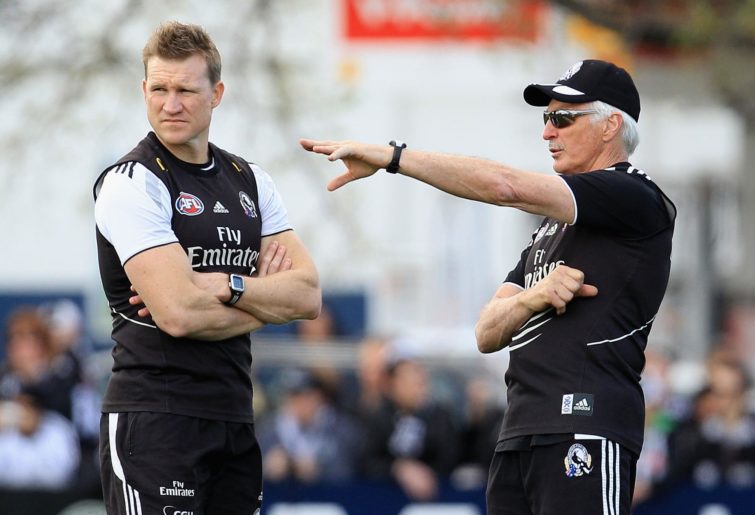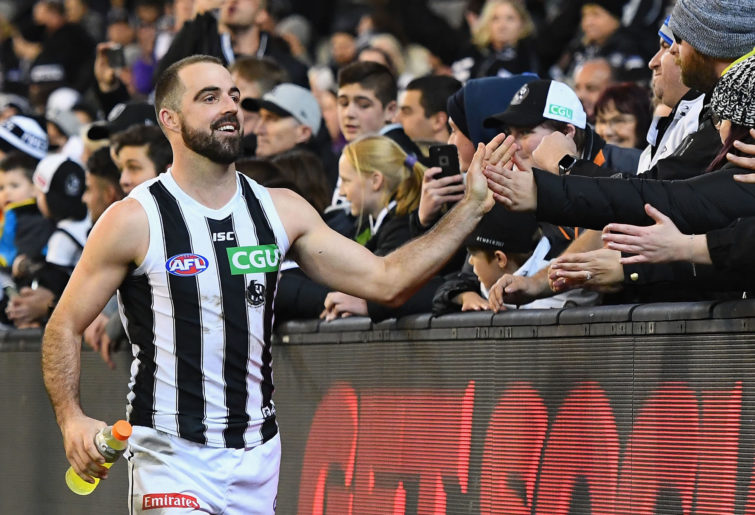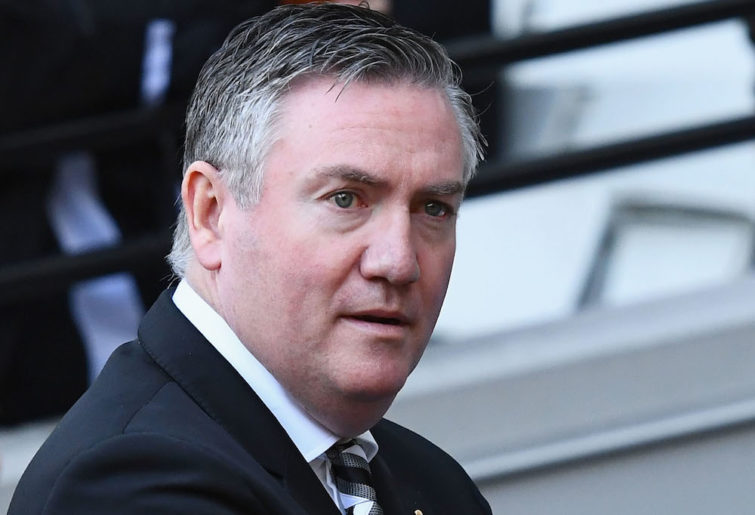Back in 1999 I started a football website called The Collingwood Rant where I (under the nickname of 'Sly') and a handful of other writers ranted about all things Collingwood.
As far as I'm aware it was the third unofficial Collingwood-based website, following the granddaddy of them all, Nick's Collingwood Page, run by the magnificent Mike and Nick Wilson; and Extreme Black 'n' White, where the irreverent Hotrod offered witty and incisive match reports. He also moderated a message forum, the Bullet 'n' Board, which remains alive to this day.
Other websites followed, including Buckley's Surfers, where the likes of Driver, Toris, Santiago, Conno and others zealously wrote about Collingwood, and From the Outer, run by the likes of Bluto and Flounder. The latter also hosted their own forum. There was a lot of Collingwood talk going around, with each forum developing its own personality.
As far as the fan sites are concerned, what everybody had in common was passion for Collingwood, eloquence and the desire to see the club succeed. While Collingwood's supporter base is stereotyped as toothless, unemployed et cetera, it might surprise some that this was an eclectic and accomplished group who came from all walks of life.
At the time Collingwood was struggling. While the decade beginning 1990 started with a flag, it ended with a wooden spoon in 1999. Tony Shaw resigned as coach. The list was in a perilous state, and off-field things had gone awry. Allegedly the club's financial situation was so dire they faced extinction.
The internet offered a broader community the capacity to connect with others who thought similarly. It gave voice to the voiceless or to those who might not otherwise find the opportunity to speak their mind. And back then it was real frontier territory.
Sports opinion delivered daily
I know I had little idea what I was doing from a technical standpoint and often leant on Mike from Nick's Collingwood Page, who was extremely generous with his time and wisdom. What I picked up with HTML coding I did through Mike or through trial and error, finding out what happened when I poked around and changed things.
But another reason I believe these fan sites popped up was disillusionment. Collingwood's poor performances were outraging fans to speak up. I didn't like what was happening at the club and wanted to shout it at the world to try and influence others to feel the same way in the hope things would change. It'd be little surprise if that fire still burnt.
The biggest enemy in any organisation is apathy, acceptance and blind faith. People didn't seem to care about Collingwood anymore, or they accepted their lot. They weren't even mediocre. They were miserable. This was the new default. It was hard to reconcile given I'd grown up with this club being generally successful in the home-and-away season and finals.
When Eddie McGuire took over at just 34 years of age he invigorated the club and gave them direction. He was a young reporter who'd skyrocketed through the journalistic ranks and was making a name for himself.
I thought that if he could apply the same energy and focus to Collingwood, the club would not only improve but also become a leader in a competition that was moving into a new age where clubs had to observe salary caps and rebuild through the draft and judicious training rather than big-name recruiting, as had occurred in the 1970s and 1980s.
I wasn't a Mick Malthouse fan when he was appointed coach, although when I attended training I was impressed with how he addressed his charges. He was a calm, steadying figure, and coming from West Coast – who hadn't missed the finals in the ten years he'd coached them – imposed a new set of expectations upon Collingwood.
I recall to this day how he talked to the players during one preseason session I attended about taking the "initiative" when it was required. While his coaching was strictly regimented and his strategies rigid – some would say inflexible – he seemed to be giving the players licence to go for it if the opportunity presented itself.

Nathan Buckley and Mick Malthouse (Photo by Hamish Blair/Getty Images)
Collingwood also moved from Victoria Park to state-of-the-art facilities at what's now known as the Holden Centre. I know I wasn't the only one to feel disappointed with the move from their ancestral home and that the relocation hurt the club's identity even if it modernised their brand. Following Collingwood's move, a Richmond friend rechristened Collingwood as 'Northbank'.
But as Collingwood moved through the decade they rebuilt their standing. They made grand finals in 2002 and 2003 only to lose them in typically Collingwoodian circumstances. The seasons of 2004 and 2005 were wastelands of injury, dealing with the psychic wounds of losing successive grand finals, and rebuilding. But then they were back in the finals in 2006 and, despite losing ageing champions, improved incrementally.
The 2010 flag was the culmination of a decade of hard work, near misses and a bit of overdue luck. It wasn't the relief that the 1990 flag was, when so many supporters openly wept after experiencing so many grand final losses. This could be a genuine celebration. Those dark years from the 1990s (and mid-1980s as well as 1970s – see a pattern?) seemed alien now, if not cautionary tales.
It couldn't get much better than this.
It should've also been the start of something.

(Quinn Rooney/Getty Images)
Mick Malthouse has spoken about how he felt it should've been the beginning of a mini-dynasty, but we now know the succession plan led to a cultural change that saw an exodus from that premiership squad followed by four years in the wilderness before an improbable charge up the ladder in 2018 culminating in what else but a lost grand final.
Comparing those decades of the McGuire administration produces a contrast: from 2000 to 2009 Collingwood felt focused, driven and productive. Despite the 2002-03 grand final losses, it was an enjoyable time to follow Collingwood. And while Mick Malthouse was a polarising figure, I think many Collingwood fans enjoyed his surly press conferences and the way he stood up for the club.
Once the flag was won in 2010 it felt like Collingwood spent the rest of the decade constantly reassessing where they were, getting it wrong and trying to adapt, playing catch-up for all the mistakes they made off the field. I know a number of supporters who grew disenfranchised. This hadn't been a gradual decline, as had occurred in the 1990s, but a plummet.
When Eddie McGuire resigned earlier this year he spoke about all the off-field initiatives he and his administration had overseen during his time. Outside of the formation of their AFLW and netball teams I had no idea the bulk of these existed. Like so many Collingwood supporters, my primary interests are on the field.
And while Collingwood played finals in 2019 (losing a preliminary final to a vastly depleted GWS side) and 2020 (being smashed by Geelong), that same torpor has developed around the club.

Eddie McGuire (Photo by Quinn Rooney/Getty Images)
It's a strange juxtaposition – to be somewhat successful on the field but to feel as if it's never quite clicking and to dread surrendering leads or players getting injured or the next off-field debacle. These have become the new default positions. When they happen there's no surprise.
I also wonder – and worry – about the club's financial standing following COVID, losing sponsors and the fallout from the trade debacle and the Do Better report. Several months ago a friend rang the membership hotline to renew. A relieved operator told him it was nice to deal with somebody who wasn't cancelling. Just how many members haven't renewed because of various circumstances? How much has the club been hurt financially?
Although some fans remain defiant and confident that the club is fine and will bounce back stronger than ever – the typical fallback of the idealistic – I know there are many who are concerned about the short and mid-term future. It seems unlikely that any club could die in today's age, but we've seen clubs take years to recover from maladministration.
Right now Collingwood have joint interim presidents, Mark Korda and Peter Murphy. Korda has been there since 2007, while Murphy joined in 2018 after conducting a review of the club and making a series of recommendations. Only one recommendation was ignored: fixed terms for administrators.
On that most credible of news platforms – Twitter – Tom Browne posed that the Collingwood board were deadlocked about who should be the next president: Murphy or Korda. If true, it's an astonishing position for the club to adopt.
They have fractured their relationship with many of their members. Some criticise the club for acting autonomously. And here's another example. Surely the best thing for the club to do would be to go back to the members, have the candidates pitch their vision of Collingwood and let the members vote.
This would help the club rebuild their relationship with their fan-base and give the members an opportunity to reinvest in the club. It would also repair the image the club has built, at least in regard to the powers that be. Every football club should belong to all its people – staff, players and fans – rather than the tyranny of an administration.
However, if Browne's report is true, I'm not surprised.
The club has made some sizeable missteps in just the last six months, from their horrific and indefensible salary cap bungle and their woeful trading to their handling of the Do Better report. It's a weighty list, and while some might petulantly declare that we should 'get over it' or 'forget about it', we should keep remembering simply because its evidence of a brains trust repeatedly making bad decisions.
Everybody at the club is complicit. If anybody had opposing views to how issues such as these should've been handled, they obviously didn't get them across or kept silent – surely not the attitude you'd want. And these people are still there. How do we know they're not capable of more questionable choices?
Something else to query is whether anybody currently at Collingwood has the objectivity to right the Collingwood ship and proactively lead them into the future. Wouldn't it be better to seek somebody from outside the Collingwood sphere, just as McGuire was once an outsider whose fresh perspectives help revitalise the club?
In an article on 11 February The Age reported John Bertrand, the skipper of Australia II – the yacht that in 1983, ended the New York Yacht Club's 132-year defence of the America's Cup – as a left-field option for the Collingwood presidency.
I don't know Bertrand, whether he's serious, and what his vision for Collingwood would be, but I did recognise one name the article mentioned as a possible board candidate: Con Frantzeskos – otherwise known as Conno from Buckley's Surfers, who is a digital marketing expert and both a leader and innovator in his field.
It's amazing how events can go full circle, back to a time where Collingwood's struggles gave birth to this initial movement, and it made me think: these are the people Collingwood desperately need now – people who are grassroots, currently relevant, have fresh perspectives and don't look at the future as a course to be navigated but uncharted territory where they can forge a new and exciting path for the club.
If I had my choice, I know who I'd be picking.








No comments:
Post a Comment